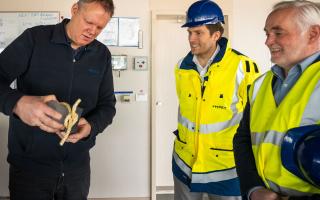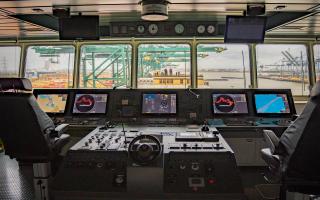Exclusive: First methanol bunkering with deep-sea vessel in Port of Antwerp-Bruges at MPET
1 April 2024 - On Monday 1 April, the world’s first large methanol-powered deep-sea vessel ‘Ane Maersk’ called the Antwerp port at the MSC PSA European Terminal (MPET). The vessel completed its first bunker operation in European waters, bunkering 4.300 tons of green methanol and 1.375 tons of biodiesel (B100) during the port stay. The successful and efficient bunkering is a new milestone in Port of Antwerp-Bruges’ ambition to become a multifuel port.
Efficient bunkering
The call at the Antwerp port is part of ‘Ane Maersk’s’ maiden voyage from South Korea to China, fuelled by green methanol. The container vessel built by Hyundai Heavy Industries in South Korea has a nominal capacity of 16,000 containers (TEU) and is equipped with a dual-fuel engine enabling operations on methanol as well as biodiesel and conventional bunker fuel. ‘Ane Maersk’ is the first of Maersk’s 18 large methanol-enabled vessels, that will be delivered between 2024 and 2025 and world’s second methanol-enabled container vessel.
Emma Mazhari, Head of Energy Markets van A.P. Moller – Maersk: “We are excited to partner with Port of Antwerp-Bruges on the maiden voyage of Ane Maersk. This is an important step in our efforts to reach net-zero greenhouse gas emissions by 2040. We value all our partners which contributes to the decarbonisation of shipping and logistics, and we are pleased to see both the green fuel and bunkering infrastructure making promising development."
The bunkering took place at the MPET terminal and was accomplished safely during terminal operations. TankMatch dispatched two barges to transfer 4.300 tons of green methanol onto the Ane Maersk. Subsequently, a barge from VT Group delivered 1.375 tons of biodiesel (B100) . The bunkering process was seamlessly integrated into the vessel’s port stay, combining bunkering simultaneously with on- and off-loading of cargo. The so called ‘simultaneous operations’ (SIMOPS) increased the efficiency of the port stay by lowering additional time allocation for refuelling. This impressive milestone reflects the excellent collaboration between multiple stakeholders involved.
Johan Van Daele, CEO MPET: "As the largest container terminal in the port of Antwerp, we are proud of the arrival and successful bunkering of the Ane Maersk. This achievement was the result of meticulous planning and cooperation between all parties involved. During the operation, SIMOPS (simultaneous operations) went exceptionally well, with minimal impact on our regular operations. This success underlines our commitment to safety, efficiency, sustainability and innovation and shows that efficiency and sustainability can go hand in hand. A big thank you to the staff of MPET who have again ensured the efficient handling of this vessel."
Towards a multifuel port
For Port of Antwerp-Bruges, this is also a milestone in its ambition to become a multifuel port, where a multitude of different climate neutral fuels such as hydrogen, ammonia, methane and methanol are available for bunkering, in addition to the range of bio- and conventional bunker fuels already available. Port of Antwerp-Bruges already has the capacity to store climate neutral fuels for use within its industrial cluster and distribution to the hinterland. In the context of the broad energy transition, where hydrogen carriers like methanol, ammonia, and methane are set to play pivotal roles, many tank storage terminals have invested in extra capacity or are planning to do so.
Jacques Vandermeiren, CEO van Port of Antwerp-Bruges, commented: “As the fifth largest bunkering port in the world, we are committed to playing a pioneering role in the integration of climate neutral fuels to the bunker market. Port of Antwerp-Bruges will provide facilities where possible, make both platforms multifuel ready and is itself committed to making its fleet greener by using alternative fuels.”
In the process of enabling the bunkering of climate neutral fuels at both its platforms, Port of Antwerp-Bruges has conducted risk assessments for all types of fuel, is setting up safety protocols and will ensure the highest qualifications within its bunkering ecosystem by implementing a licensing system for bunker operators.
"The successful bunkering of this new generation vessel proves that we are taking the right steps to further transform our port into a multifuel port by 2025: a port where, in addition to traditional fuels, more sustainable alternative fuels such as methanol are offered. As ambitious pioneering port, port of Antwerp-Bruges aspires to be an inspiration for the entire maritime sector", concludes Annick De Ridder, President of the board of directors of Port of Antwerp-Bruges.



